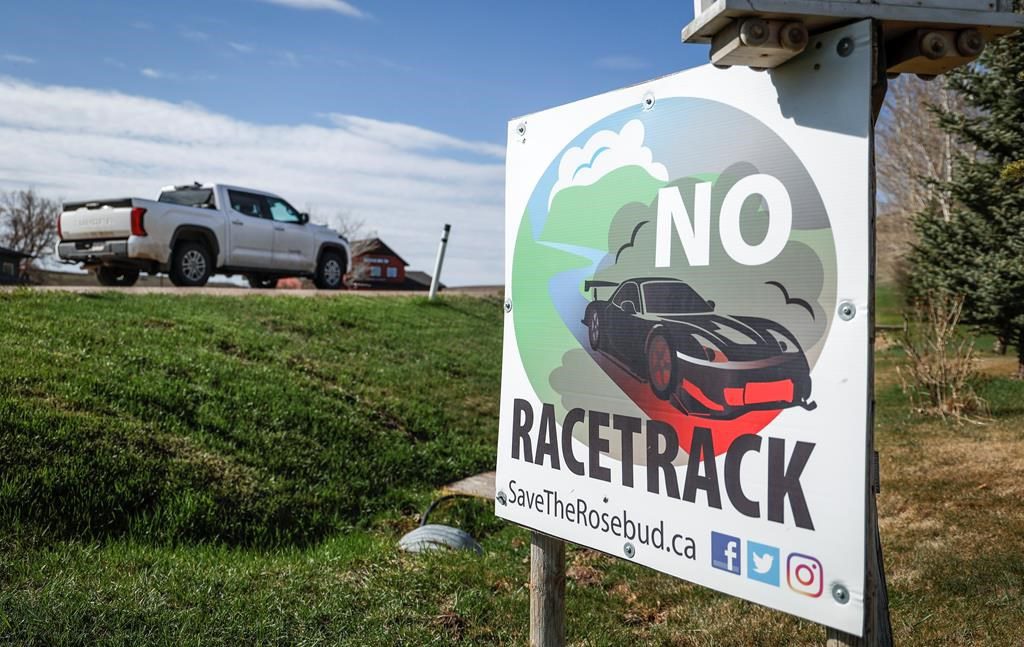ROSEBUD, ALBERTA — The rolling hills leading to the hamlet of Rosebud are dotted with sprawling farms and cattle pastures — and a sign sporting a simple message: No Race Track.
Near that sign is another one telling would-be trespassers to stay off raceway property.
That sign is riddled with bullet holes, a pockmarked symbol of an 11-year battle pitting local landowners against a motorsport family determined to realize a dream of world-class racing.
The dream began in 2006 when Badlands Motorsports Resort purchased 194 hectares of prime land along the Rosebud River valley, northeast of Calgary.
The plan is to build a $500-million racing park for street-legal machines. There will be multiple racetracks, a go-kart track, a hotel and condominiums.
Some local landowners want no part it.
“I am angry that we have to put our community through this. It’s not right. It should never have gotten this far,” Wendy Taylor said.
“We actually couldn’t believe that somebody would want to have property here and not enjoy it for the natural value that it has.”
Taylor made the comments in an interview alongside husband Richard and neighbour Rick Skibsted.
They have Rosebud in the blood: Richard and Rick were born and raised there while Wendy Taylor has been in the hamlet for 42 years.
Rosebud is in and of itself a tourist draw, known for its local theatre and pie shop.
On the other side is a group of doctors, led by Calgary radiologist Dr. Jay Zelazo. They bought the property, five kilometres from Rosebud, to build a new raceway after the only track near Calgary was struggling to stay afloat.
“It was the only property that we found that was suitable,” said Zelazo’s father James, who serves as Badlands’ chief financial officer.
“It’s our land and we’ve done what was required.”
He said there have been unexpected costs added to the $30-million price tag for the first phase of the project.
Zelazo said the company has to pave a 10-kilometre stretch of narrow, winding road to the site itself at a cost of $15 million.
Zelazo said the constant delays are frustrating.
“It’s the financing that we need to get. It’s nothing else. We have all the approvals,” he said.
“It’s disheartening (that opponents) won’t accept what the county made sure we did, meeting the bylaw requirements and all the documents just because they don’t want it.”
Opponents were concerned that filling in two wetlands to build the track would harm birds such as bank swallows, eagles, hawks and falcons.
Alberta’s Environmental Appeals Board dismissed that concern in March for lack of evidence and Environment Minister Rebecca Schulz later agreed with that decision.
But Schulz noted the board did order environmental monitoring and field surveys.
“They wanted to see some additional mitigation done to protect wetlands,” Schulz recently told reporters.
“I did accept that.”
Skibsted said swallows are already getting hit by cars and trucks and says the proposed racetrack will make things worse, coming between the birds and their food source.
The Alberta Wilderness Association said its concerns about the racetrack are more about the location than the project itself.
Conservation specialist Kennedy Halvorson said about three-quarters of the natural grassland in the Rosebud River valley is already gone due to human activity.
“It’s kind of one of the last areas of the grasslands that’s super healthy and has a lot of biodiversity. It’s also home to about 85 per cent of Alberta’s species at risk and the Rosebud River is no different,” Halvorson said.
Opponents say there can still be a win-win, that a fair offer is on the table if Badlands wants to sell the land.
“We would pay what it’s worth. It’s increased in value. We’ll provide a fair and equitable exit,” said Richard Taylor.
If it’s no sale, the next step might be court, perhaps a judicial review of the environmental board decision.
“We’ve still got some more tools in our tool kit,” said Wendy Taylor.
“We’re not done yet.
“And we’re pretty patient.”
This report by The Canadian Press was first published May 11, 2024.
— With files from Bob Weber in Edmonton
Bill Graveland, The Canadian Press





